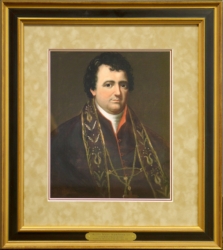From Cardinal Seán’s blog
Cardinal Newman
As I do every year, I went down to Washington, D.C. last week for the March for Life.
After arriving in Washington on Thursday (Jan. 21) afternoon, I visited with Father Richard Duffield from the Birmingham Oratory in England and Patrick Reilly of the Cardinal Newman Society.
They came to see me at Capuchin College, where I was staying and talk to me about Cardinal Newman’s cause of canonization. We are very proud that the miracle that was accepted in the process of beatification took place in Boston. A deacon from the archdiocese, Jack Sullivan, was cured of a debilitating back injury as he prayed to Cardinal Newman for his recovery.
The beatification will likely take place in the fall. The Holy Father has a trip planned to England in September and, hopefully, he will officiate at the ceremony during the trip. No official announcement has been made as to the details, but we hope that they will be announced soon.
Cardinal Newman was an important intellectual in the life of the Church who came out of the Anglican tradition. He was one of the founders of the Oxford Movement, an Anglo-Catholic movement that resulted in many Anglicans joining the Church; for instance the Graymoor Friars and Nuns and many other extraordinary individuals who brought with them great talent and energy to the life of the Church. Certainly, Cardinal Newman was one of the great Catholic intellectuals of the English-speaking world and his conversion to Catholicism was a very powerful testimony.
College of the Holy Cross
On Monday (Jan. 25), I went to the College of the Holy Cross. The Jesuits at Holy Cross have invited me many times because there are so many students from Boston there. They also invited me because the university was founded by Bishop Fenwick, the second bishop of Boston.
Bishop Fenwick was from one of those old Catholic Maryland families. He was a fifth-generation American descendant of those Catholics who came to Maryland when Lord Baltimore established it as a Catholic colony. He joined the Jesuits and taught at Georgetown University. He was later named second Bishop of Boston when Bishop Cheverus was recalled to France to become the Cardinal Archbishop of Bordeaux.
As a Jesuit, he had great interest in education and founded the Ursuline school in Charlestown. When that was burnt down, he decided that the college he was going to found should be farther away from the city so it would be safe from the Know-Nothings. So he built it in Worcester, which was still part of the Archdiocese of Boston in those days. He named it the College of the Holy Cross to have the connection with the Cathedral of the Holy Cross in Boston.
The college has flourished and has been a very important ministry of the Jesuits in the New England Province.
During my visit, I had a meeting with the students in which they talked to me about their experience at Holy Cross, particularly their activities in campus ministry. I was very happy to see that they have both a chapter of the Knights of Columbus and also the Catholic Daughters of America. They have also been very involved in relief for Haiti and a number of different activities.
After my conversation with the students, we had Mass in a beautiful chapel. Several hundred students attended. It was very gratifying to see how at 4 p.m. on a school day, so many students would come to Mass. I was joined by a number of Jesuits, including the provincial, Father Myles Sheehan, the president, Father Michael McFarland, and three bishops from Worcester Bishop Robert McManus, retired Bishop Dan Reilly, and retired auxiliary Bishop George Rueger. The abbot of St. Joseph Abbey in Spencer was also with us.



















